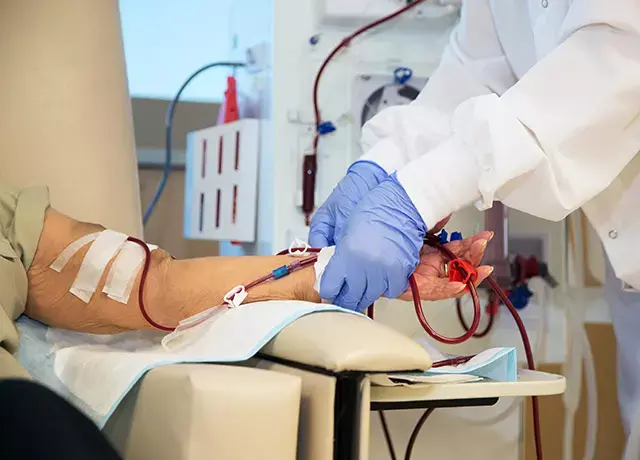- Home
- Medical news & Guidelines
- Anesthesiology
- Cardiology and CTVS
- Critical Care
- Dentistry
- Dermatology
- Diabetes and Endocrinology
- ENT
- Gastroenterology
- Medicine
- Nephrology
- Neurology
- Obstretics-Gynaecology
- Oncology
- Ophthalmology
- Orthopaedics
- Pediatrics-Neonatology
- Psychiatry
- Pulmonology
- Radiology
- Surgery
- Urology
- Laboratory Medicine
- Diet
- Nursing
- Paramedical
- Physiotherapy
- Health news
- Fact Check
- Bone Health Fact Check
- Brain Health Fact Check
- Cancer Related Fact Check
- Child Care Fact Check
- Dental and oral health fact check
- Diabetes and metabolic health fact check
- Diet and Nutrition Fact Check
- Eye and ENT Care Fact Check
- Fitness fact check
- Gut health fact check
- Heart health fact check
- Kidney health fact check
- Medical education fact check
- Men's health fact check
- Respiratory fact check
- Skin and hair care fact check
- Vaccine and Immunization fact check
- Women's health fact check
- AYUSH
- State News
- Andaman and Nicobar Islands
- Andhra Pradesh
- Arunachal Pradesh
- Assam
- Bihar
- Chandigarh
- Chattisgarh
- Dadra and Nagar Haveli
- Daman and Diu
- Delhi
- Goa
- Gujarat
- Haryana
- Himachal Pradesh
- Jammu & Kashmir
- Jharkhand
- Karnataka
- Kerala
- Ladakh
- Lakshadweep
- Madhya Pradesh
- Maharashtra
- Manipur
- Meghalaya
- Mizoram
- Nagaland
- Odisha
- Puducherry
- Punjab
- Rajasthan
- Sikkim
- Tamil Nadu
- Telangana
- Tripura
- Uttar Pradesh
- Uttrakhand
- West Bengal
- Medical Education
- Industry
CKD-associated pruritus in patients on hemodialysis increases stress, depression and fatigue

A recent study published in the American Journal of Kidney Diseases shed light on the link between chronic kidney disease-associated pruritus (CKD-aP) and its impact on patient health outcomes. This study, conducted across 21 countries and involving 7976 patients receiving maintenance hemodialysis, explored the longitudinal associations between changes in CKD-aP and various clinical outcomes.
The study, a part of the Dialysis Outcomes and Practice Patterns Study (DOPPS) in phases 4-6 (2009-2018), involved assessing CKD-aP symptoms in patients approximately 12 months apart. Four distinct groups emerged based on these assessments: those with pruritus only at the initial assessment (resolved), only at the second assessment (incident), at neither assessment (absent), or at both assessments (persistent).
The findings revealed a striking prevalence of moderate to severe CKD-aP symptoms among the participants, with 51% experiencing such symptoms at either assessment, and 22% suffering from persistent pruritus. Notably, patients who developed incident pruritus experienced an increase in depression, restless sleep, and fatigue over the study period, while those with resolved pruritus saw decreases in these symptoms.
Crucially, the study demonstrated that patients with persistent CKD-aP faced significantly higher risks of adverse clinical events. Comparing them to patients without CKD-aP, those with persistent symptoms had adjusted hazard ratios of 1.29 for all-cause mortality, 1.17 for all-cause hospitalization, and 1.48 for cardiovascular events. This underlines the serious impact of CKD-aP on patient health and well-being.
The lack of interim evaluations between the two assessments and potential selection biases among patients lost to follow-up might have influenced the results. Nevertheless, the study's conclusions highlight the chronic nature of CKD-aP symptoms and stress the importance of repeated assessments using standardized methods. This research underscores the significance of recognizing and managing CKD-aP as an integral part of patient care.
Source:
Sukul, N., Zhao, J., Pisoni, R. L., Walpen, S., Schaufler, T., Asgari, E., Zho, L., Al-Ghonaim, M. A., Nitta, K., Robinson, B. M., & Karaboyas, A. (2023). Pruritus in Hemodialysis Patients: Longitudinal Associations With Clinical and Patient-Reported Outcomes. In American Journal of Kidney Diseases. Elsevier BV. https://doi.org/10.1053/j.ajkd.2023.04.008
Neuroscience Masters graduate
Jacinthlyn Sylvia, a Neuroscience Master's graduate from Chennai has worked extensively in deciphering the neurobiology of cognition and motor control in aging. She also has spread-out exposure to Neurosurgery from her Bachelor’s. She is currently involved in active Neuro-Oncology research. She is an upcoming neuroscientist with a fiery passion for writing. Her news cover at Medical Dialogues feature recent discoveries and updates from the healthcare and biomedical research fields. She can be reached at editorial@medicaldialogues.in
Dr Kamal Kant Kohli-MBBS, DTCD- a chest specialist with more than 30 years of practice and a flair for writing clinical articles, Dr Kamal Kant Kohli joined Medical Dialogues as a Chief Editor of Medical News. Besides writing articles, as an editor, he proofreads and verifies all the medical content published on Medical Dialogues including those coming from journals, studies,medical conferences,guidelines etc. Email: drkohli@medicaldialogues.in. Contact no. 011-43720751


